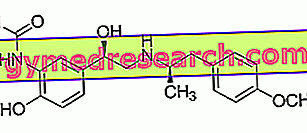Formoterol is a bronchodilator belonging to the class of long-acting selective β2-adrenergic receptor agonists.
Formoterol is used for the treatment of asthma. In fact, it is available in the form of pharmaceutical formulations suitable for inhalation administration.
Examples of medicinal specialties containing Formoterol
- Foradil ®
- Formodual ®
- Symbicort ®
Indications
For what it uses
The use of formoterol is indicated for the treatment of bronchospasm in patients with chronic bronchopneumopathies, such as:
- Bronchial asthma;
- Chronic bronchitis, with or without pulmonary emphysema.
Furthermore, formoterol can be used for the treatment of allergen-induced bronchospasm, stress or cold.
Warnings

Formoterol - Chemical Structure
Before starting formoterol therapy, it is advisable to inform your doctor if you are in one of the following conditions:
- If you suffer from cardiovascular diseases;
- If you have diabetes;
- If you suffer from severe acute asthma;
- If you are suffering from thyroid disease;
- If you suffer from liver diseases, such as, for example, liver cirrhosis;
- If you suffer from hypokalemia (that is, reduced potassium levels in the bloodstream).
In patients whose asthma is adequately controlled by corticosteroid therapy, the use of formoterol is not indicated.
Formoterol can be used in addition to treatment with corticosteroids only when the latter is not sufficient to control asthma.
During formoterol therapy a paradoxical bronchospasm may occur, if this should occur, treatment with the drug should be immediately suspended and the doctor should be informed immediately.
Formoterol could cause side effects that could compromise the ability to drive and / or use machinery, therefore, caution should be used.
Interactions
Before starting treatment with formoterol, you must tell your doctor if you are already taking any of the following medications:
- Β-blocking drugs, such as propranolol and atenolol (used in the treatment of hypertension) or timolol (used in the treatment of glaucoma);
- Quinidine, an antiarrhythmic drug;
- Digoxin, a drug used to treat heart failure;
- Diuretics, such as, for example, furosemide;
- Prednisolone or other corticosteroids taken orally;
- Methylxanthines used in the treatment of asthma, such as theophylline and aminophylline;
- Erythromycin, a macrolide antibiotic;
- Terfenadine and other antihistamine drugs;
- Ephedrine ;
- Tricyclic antidepressants, such as, for example, nortriptyline or amitriptyline.
In any case, it is advisable to inform your doctor if you are taking - or have recently been taken - medicines of any kind, including non-prescription drugs and herbal and / or homeopathic products.
Side effects
Treatment with formoterol can cause various types of side effects, although not all patients experience them. This depends on the sensitivity that each individual has towards the drug. Therefore, it is not said that all adverse effects occur with the same intensity in each patient.
The following are the main side effects that may occur during treatment with formoterol.
Cardiac disorders
Formoterol-based therapy can promote the onset of:
- Palpitations;
- Atrial fibrillation;
- Supraventricular tachycardia;
- extrasystole;
- Angina pectoris;
- Prolongation of the QT interval (the interval of time necessary for the ventricular myocardium to depolarize and repolarize).
Allergic reactions
Formoterol can cause the onset of allergic reactions in sensitive individuals. These reactions can manifest themselves in the form of:
- Angioedema;
- bronchospasm;
- Skin eruptions;
- Itch;
- Urticaria;
- Rashes.
Nervous system disorders
Treatment with formoterol can cause headaches, tremors and dizziness. Moreover - even if rarely - the drug could favor the onset of alterations of the sense of taste.
Psychiatric disorders
Formoterol therapy can cause:
- Anxiety;
- agitation;
- Restlessness;
- Sleep disorders.
Musculoskeletal disorders
Muscle pain and cramps may occur during treatment with formoterol.
Metabolism and nutrition disorders
Formoterol therapy may promote the appearance of hypokalaemia and hyperglycemia.
Lung and respiratory tract disorders
Treatment with formoterol may cause:
- Cough;
- Paradoxical bronchospasm;
- Throat irritation.
Furthermore, formoterol can also cause worsening of asthma in children aged between 6 and 12 years.
Other side effects
Other side effects that may occur during therapy with formoterol are:
- Nausea;
- Dry mouth;
- Skin eruptions;
- Increased blood pressure.
Overdose
Symptoms such as:
- Palpitations;
- Tremors;
- Headache;
- Tachycardia;
- Nausea and vomit;
- Hypertension;
- Hypokalemia;
- Hyperglycemia;
- Extension of the QT interval.
In the event of overdosage, the treatment envisaged is purely symptomatic and supportive.
In any case, if you suspect you have taken an overdose of formoterol, you must contact your doctor immediately and contact the nearest hospital.
Action mechanism
Formoterol is a selective β2-adrenergic receptor agonist present at the level of the smooth muscles of the bronchi and lungs.
By binding to the aforementioned receptors, formoterol promotes the extrusion of calcium ions from bronchial smooth muscle cells, thereby reducing their bioavailability.
Since the calcium ion is responsible for bronchoconstriction, the decrease in its concentration induced by formoterol favors the dilation of the bronchi themselves.
Formoterol has a duration of action of about twelve hours, so it is very useful in preventing the onset of nocturnal asthma symptoms.
Method of use and dosage
Formoterol is available as a pressurized suspension for inhalation and as a powder for inhalation that must be dispensed using the appropriate device.
In adolescents over 18 years of age and in adults, the usual formoterol dose is 12-24 micrograms drug, to be taken twice a day.
In children over six years of age, the recommended dose is 12 micrograms of formoterol, to be taken twice a day.
It is good to remember that during therapy with formoterol it is absolutely necessary to follow carefully the indications provided by the doctor - both as regards the dose of the drug to be used, both as regards the frequency of administration and the duration of the same therapy - so as to avoid the occurrence of serious side effects, especially those of the cardiovascular type.
Pregnancy and breastfeeding
Since there are not enough studies to determine the safe use of formoterol by pregnant women and by breastfeeding mothers, the use of the drug in this category of patients is not recommended.
In any case, pregnant women and mothers who are breast-feeding, before taking any type of medicine, should always seek medical advice.
Contraindications
The use of formoterol is contraindicated in the following cases:
- In patients with known hypersensitivity to the same formoterol;
- In patients with heart disease;
- In patients with thyrotoxicosis;
- In patients with hypokalemia;
- In children under six years of age;
- Pregnant;
- During breastfeeding.



